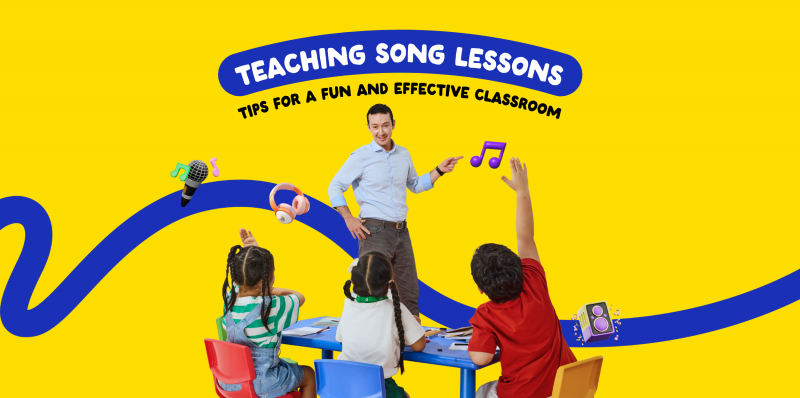If you’ve ever opened an ESL textbook for young learners, chances are you’ve noticed something fun tucked into each unit: songs! From catchy chants to full-on singalongs, songs are a staple in English classrooms for good reason. They boost listening skills, improve pronunciation, reinforce new vocabulary, and—best of all—turn learning into play.
But here’s the catch: as joyful as song lessons can be, they’re not always easy for new teachers. Some students may get shy, others may get too excited, and sometimes the song just feels like background noise instead of a learning tool.
So, how can you make your song lessons both fun and effective? Read on to explore some of the challenges that come with song lessons, as well as some fun ideas to make your next song lesson a chart-topper! Let’s dive in!
Table of Contents
Why Should I Be Singing With My Students?
Songs and chants are amazing tools in a young-learner class. The rhythm and melody make new vocabulary easier to remember, and the music will instantly grab your students’ attention. Some other perks of singing in class:
- Pronunciation Practice: Singing along naturally improves stress, intonation, and pronunciation.
- Listening Skills: Songs expose children to authentic sounds, helping them catch patterns and phrases.
- Confidence Booster: Singing in a group feels less intimidating than speaking alone, so even shy students join in.
- Energy & Engagement: Songs turn lessons into playtime, keeping kids active and excited about learning.

Many ESL textbooks include songs and chants in almost every unit, so it’s a good idea to start learning how to teach them properly now!
The Challenges of Song Lessons
Compared to the typical grammar or vocabulary lesson, song lessons with young learners come with a unique set of hurdles:
- Shy singers: Some kids clam up the moment music starts.
- Energy overload: Others might treat it like a rock concert (and forget the English part).
- Song speed: Lyrics can feel too fast for beginners.
- Easily forgotten: Without reinforcement, today’s catchy tune can disappear by next week.

Visuals contextualize vocabulary. A single image can do what a whole sentence can’t—show where something happens, how people interact with it, or what role it plays in daily life. Even better, visuals trigger emotional engagement.
A cute puppy. A funny cartoon. A colorful scene. These are the things students remember—and with them, the words you’re trying to teach.
Ideas to Make Song Lessons Shine
Here are a few tried-and-true tricks to help your young learners sing their way to success:
Repetition is Key
Repetition is your best friend when teaching songs. Play the song several times, but break it into bite-sized chunks. Practice one verse at a time, add actions, and slowly build up to the full song. Kids love familiarity, and repeating helps the language stick!
Team Karaoke
Turn your classroom into a mini karaoke party! Divide the class into groups and let each group sing a line or chorus. This takes the pressure off shy students and builds team spirit. You’ll be surprised how even the quiet ones start singing louder when they’ve got teammates backing them up.

Revisit in Later Weeks
Don’t let songs be a “one and done” activity. Circle back to them in future lessons as a quick warm-up or review. Students will feel proud when they remember the lyrics—and it reinforces the language naturally without extra drilling. If the format fits, you can also use previous songs with the new unit’s content.
TPR (Total Physical Response) Songs
Add movement! Pairing lyrics with gestures or simple dances makes songs unforgettable. For example, if the song has “jump,” then everyone jumps. If it says “wave,” then wave! This works especially well with energetic learners, keeps everyone engaged, and links meaning to movement.
Take a Bow and Get Ready for the Encore
Song lessons might feel a little daunting at first, but they’re worth it. With patience, repetition, and a dash of creativity, songs can transform your classroom into a fun and effective language-learning space. Remember: the goal isn’t just to sing—it’s to learn while singing.

So next time a song lesson pops up in the textbook, don’t shy away. Crank up the music, get those kids moving, and watch how quickly English sticks when it’s wrapped in a melody.
Do you have a go-to activity for song lessons? Share your tips with us—we’d love to hear them!
Your Next Teaching Chapter Starts at VUS
At VUS, we have HappyKids courses for our young learners. Song lessons and activities go a long way in keeping these students engaged. If you’re nervous about these kinds of lessons, don’t worry, VUS has got you covered!
- Every HappyKids class has two teaching assistants to support you. They will help you get the students singing and dancing, and are great in-class karaoke partners!
- VUS offers workshops and courses throughout the year, where our lead teachers and special guest presenters will share their experiences and advice to help you get acquainted with teaching very young learners.
- We provide lesson plans for every class, which will include activity ideas to go along with the songs in the student book.
If you’re looking for a classroom that’s dynamic and engaging, join our team! Send us your application at https://teachenglish.vus.edu.vn/
As you can see, songs are a great way to get students engaged and speaking in class. We hope this blog helps you get over your stage fright and has you topping the charts in your next song lesson! Stay tuned for more Teaching Tips from VUS.
⭐ For the best English teaching job in Vietnam, look no further than VUS, the leader in English Language Teaching (ELT) in Vietnam with:
🔷 30 years of experience
🔷 68 campuses nationwide
🔷 2,700+ dedicated teachers and teaching assistants
Start your journey with VUS today by applying at:
🌏 https://teachenglish.vus.edu.vn/
⚠️ Be aware of teaching job scams! Only connect with VUS through official channels. For the list of official VUS contacts, please visit: https://teachenglish.vus.edu.vn/fake-job-warning/


